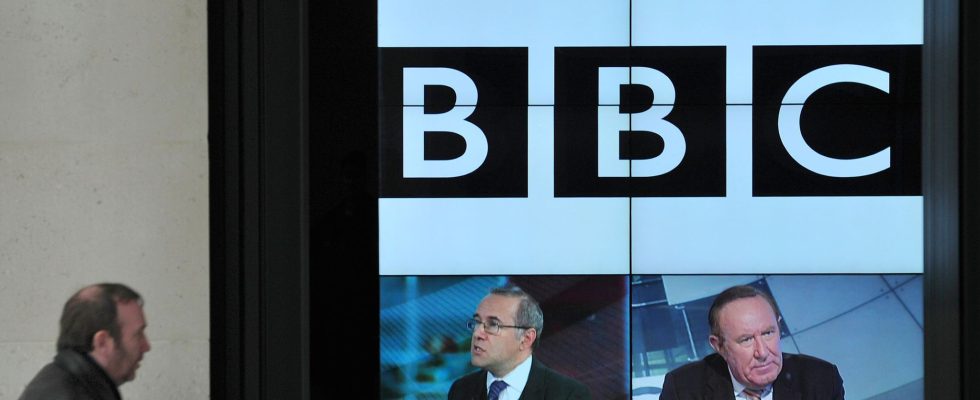It is a semantic controversy which has largely ignited the debate in France. By refusing to qualify Hamas as a terrorist group after its bloody attacks last Saturday, October 7 in Israel, Jean-Luc Mélenchon and France Insoumise were widely criticized by a large part of the political spectrum, including among his left-wing allies.
But this controversy is not limited to the French borders. Because in the United Kingdom, it is the BBC, the main British public audiovisual media, which is at the heart of a similar controversy. The latter in fact refuses to qualify Hamas as a terrorist group in its journalistic content, favoring the expressions “militant group” or “Islamist movement”. An editorial choice strongly criticized, but fully accepted and justified by the “founding principles” of neutrality of the BBC, said John Simpson, editor-in-chief of the international service and seasoned journalist from conflict zones.
In an article serving as clarification on the choice of the British audiovisual giant published Thursday October 12, the latter adds that terrorism is “a connoted word, which people use to designate an organization of which they morally disapprove. The BBC simply does not have the mission to tell people who to support and who to condemn, who are the good guys and who are the bad guys.” A decision confirmed by Deborah Turness, the director general of BBC News. She confirmed in a note to her teams that “it is not up to us to declare a group as terrorist”, but only to attribute this expression “when others do”.
“A particular apprehension”
This decision by the main British media group was nevertheless very quickly – and strongly – criticized by part of public opinion across the Channel. Defense Secretary Grant Shapps described to British radio LBC a “bordering on shameful” choice by the broadcaster, calling on it to rediscover its “moral compass” as Hamas is classified by official British authorities as a terrorist movement. “They are not freedom fighters, they are not militants, they are outright terrorists and it is incredible to see the BBC website continue to talk about gunmen and militants without labeling them of terrorists”, also added the Secretary of State. Again on Thursday, it was even a London citizen whose mother was taken hostage by Hamas who, in a press conference in London, called on the BBC to “qualify it for what it is”: a terrorist group.
This choice should nevertheless not take anything away from the BBC’s very detailed coverage of the bloody war between Israel and Hamas, since the terror of the Islamist group’s terrorist attack on Israeli civilians last Saturday October 7. The group is notably one of the only media outlets in the world to have a correspondent in Gaza, Rushdi Abu Alouf, who is currently still on site despite the extreme intensification of Israeli bombings in the region.
“No one can seriously claim that BBC correspondents did not expose to the world the ruthless and terrifying barbarity of Hamas,” says John Ware, a journalist for more than 25 years for the British public broadcaster. If the latter confirms that “most of the BBC’s reporting has been exemplary” on the extreme violence of the resurgence of the Israeli-Palestinian conflict, the latter nevertheless affirms that this choice remains “incoherent” and “unconvincing” in relation to the treatment of other Islamist groups, such as Daesh or Al-Qaeda. The latter are in fact qualified as terrorists, without this really being questioned. According to the English journalist, there is behind this choice “a particular apprehension which has crept into the editorial mind of the BBC, due to the fact that no other conflict provokes such intense emotions in both camps”.
On the BBC’s side, John Simpson nevertheless explains that it is “perfectly reasonable to describe the incidents that happened as ‘atrocities’, because that is exactly what they are. No one can defend the killing of civilians , especially children and even babies. Nor attacks on innocent and peaceful people attending a music festival.”
Tensions with the conservative camp
This is not the first time that the BBC has been called into question by the British executive. Already during the invasion of Iraq in 2004, the government at the time led by Labor Party Tony Blair denounced overly critical coverage of the military operation led by the United States, and called into question the integrity professionalism of journalists at the public broadcaster. But in recent years, it is above all the conservative camp which has made public radio one of its privileged targets, judging it to be too left-wing and impartial towards it. In 2022, Boris Johnson’s government even froze the public license fee for the BBC, citing tax cuts for households in a period of inflation. A decision quickly perceived as a form of sanction, while the Prime Minister at the time was entangled in various scandals widely covered by the British media, including the BBC.
But this principle of impartiality found itself particularly questioned during the debates on Brexit, which had largely polarized British public opinion. On the one hand, the conservatives who judged that it had been covered in a biased manner and to their disadvantage by the BBC. On the other, some who worried that the floor was given equally to pro-Brexit and pro-Europeans, without sufficient verification of the facts.
